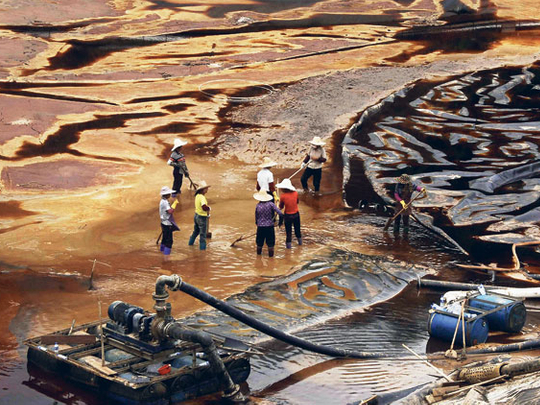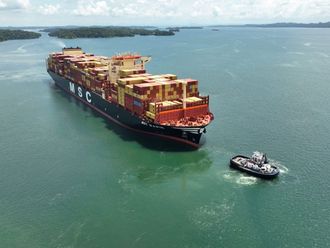
Beijing: China, the world's largest polluter, said the number of environmental accidents rose 98 per cent in the first six months of the year, as demand for energy and minerals lead to poisoned rivers and oil spills.
"Fast economic development is leading to increasing conflicts with the cap-acity of the environment to absorb" demands, the environmental protection ministry said.
An acid leak at Zijin Mining Group's copper and gold mine this month poisoned enough fish in the Ting River to feed 72,000 for a year, and Dalian's beaches and port were closed by an oil spill at the nation's largest crude terminal. The accidents underscore the toll from two decades of growth averaging 10.1 per cent that made China the third-largest economy.
"The government is starting to spend huge amounts of money cleaning up the air, and cleaning up the water," Jim Rogers, who co-founded the Quantum Hedge Fund in 1970, said from Singapore.
"It's going to lead to higher cost, just as it does everywhere in the world. A clean smelter is more expensive than a dirty smelter."
There were about 102 accidents in the first half, compared with 171 for the whole of 2010, according to figures derived from the ministry's data.
The oil spill at Dalian, 10 times the amount in the last incident in Shaanxi province in December, was the biggest in Chinese waters, according to Greenpeace.
Zijin's waste leak Fujian province was the worst in the Chinese gold industry in two years.
"If China doesn't address the environmental issues when the economy is growing fast, it might become a destabilising factor in the society," Ma Jun, founder of the Institute of Public Environmental Affairs, a researcher, said by phone from Beijing.
Deteriorated air quality
"The Chinese public is increasingly aware and vocal about the heavy metal pollution brought on by refineries and smelters."
Air quality deteriorated for the first time in five years in the first six months, the environment ministry said on July 26.
The world's largest metal and energy consumer also has the worst coal-mine safety record, with an average of seven deaths each day in accidents last year.
"Local governments are trying to develop their economies and the thinking is ‘get rich first, worry about the pollution later,'" Yang Ailun, head of the climate change unit for Greenpeace, said in Beijing.
"The central government is very aware that the current economic model is unsustainable."
An explosion at an abandoned plastics and chemical factory in Nanjing city killed at least six people, the official Xinhua News Agency said.
The ministry has started a nationwide investigation of drinking water and mine tailing ponds this year, the statement said.
It has also set up databases on violations, strengthened regulations and is encouraging residents to report complaints.
"China is in a state of development when there's a high rate of violations," the environment ministry said.
There were at least 10 incidents a month in the first half, it said.
Before the accidents at Zijin and Dalian port, the environmental ministry listed PetroChina's Songhua River toxic spill in 2005, Sichuan Chemical's waste leaks into the Tuojiang River and Shaoguan Smelting Plant's illegal discharge of cadmium as among the worst cases in the past six years.
The government has been identifying a "large number of culprits" in new cases, the ministry said in the statement.
Fatal blow
Still, the penalties for companies may be "too small," said Tony Zheng, president of Shanghai Good Hope Equity Investment Management.
"The fines won't deal a fatal blow to big Chinese companies. It's unlike in the US." Zijin said it may pay five million yuan (about Dh2.7 billion), or 0.2 per cent of last year's net income, in compensation for fish poisoned.
A penalty hasn't been decided on the leakage yet, the environment ministry said in the statement.
PetroChina, the nation's largest oil producer, was fined one million yuan, out of a net income of 133 billion yuan in 2005, for the accident that affected the drinking water of three million people.
That contrasts with the $20 billion that President Barack Obama has demanded from BP for the worst oil spill in US history.
China's environmental ministry checked almost a million companies last year, and forced more than 2,000 to stop or curb production, according to its annual report.
Between March and May this year, it monitored paper mills and water treatment companies in provinces including Guangdong and Hebei, finding that as many as half broke laws, the ministry said July 6.
"Listed mining and smelting companies are now increasingly under the surveillance of the environmental ministry and will have to get approval from them before getting funding, or licences for expansion or for rights issues," said Shi Heqing, an analyst at Beijing Antaike Information Development.
The nation passed the US to become the biggest emitter of carbon dioxide in 2006, according to the US Department of Energy. China overtook the US as the world's biggest energy user last year, according to the International Energy Agency.
New environmental rules may push up steelmakers' costs by at least 10 per cent, according to the China Metallurgical Industry Planning and Research Institute, a government adviser. The higher requirements come as China is also grappling with wage demand from workers.
"Some small and medium-size companies will go out of business with the rising labour cost and higher environment requirements," said Hu Xingdou, a professor of economics at the Beijing Institute of Technology.
"If China relies on low wage and high pollution industries, people won't benefit much no matter how the GDP rises."
Oil spill ‘60 times worse' than reported
An oil spill in northeastern China may have been about 60 times bigger than the government reported, ranking it among the world's worst known oil disasters, an environmental group said yesterday.
Greenpeace said between 60,000 and 90,000 tonnes of crude may have poured into the Yellow Sea after two pipelines exploded at an oil storage depot in the port of Dalian on July 16 — dwarfing official estimates of 1,500 tonnes.
"It's one of the 30 largest oil spills in human history," said Richard Steiner, a marine conservationist with the University of Alaska and an adviser to Greenpeace. If our estimates are correct, it is certainly larger than the Exxon Valdez spill in Alaska in 1989," Steiner told a news conference.
Official estimates said the spill covered more than 435 square kilometres of water, but one Chinese media report last week said the slick had spread to 946 square kilometres.
Steiner, who spent one and a half days in Dalian assessing the spill, said the lack of adequate aerial surveillance meant no one really knew the extent of the slick, even suggesting it could have reached North Korea by now.












